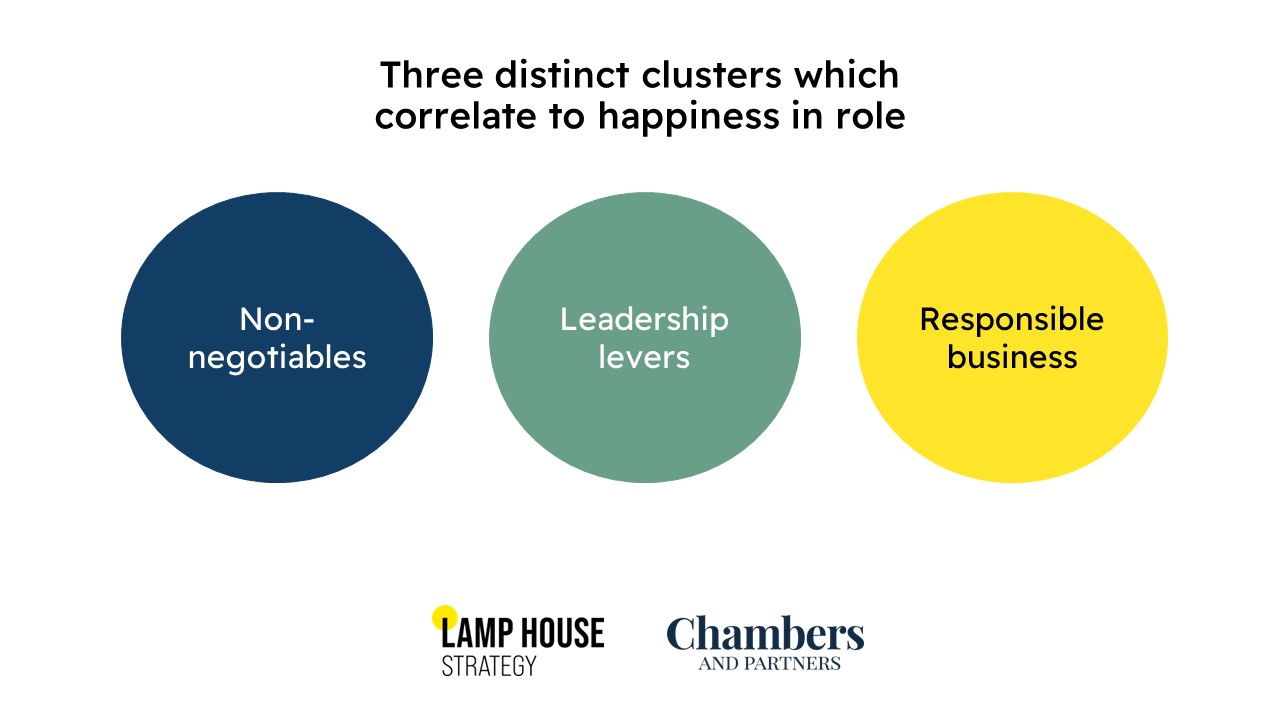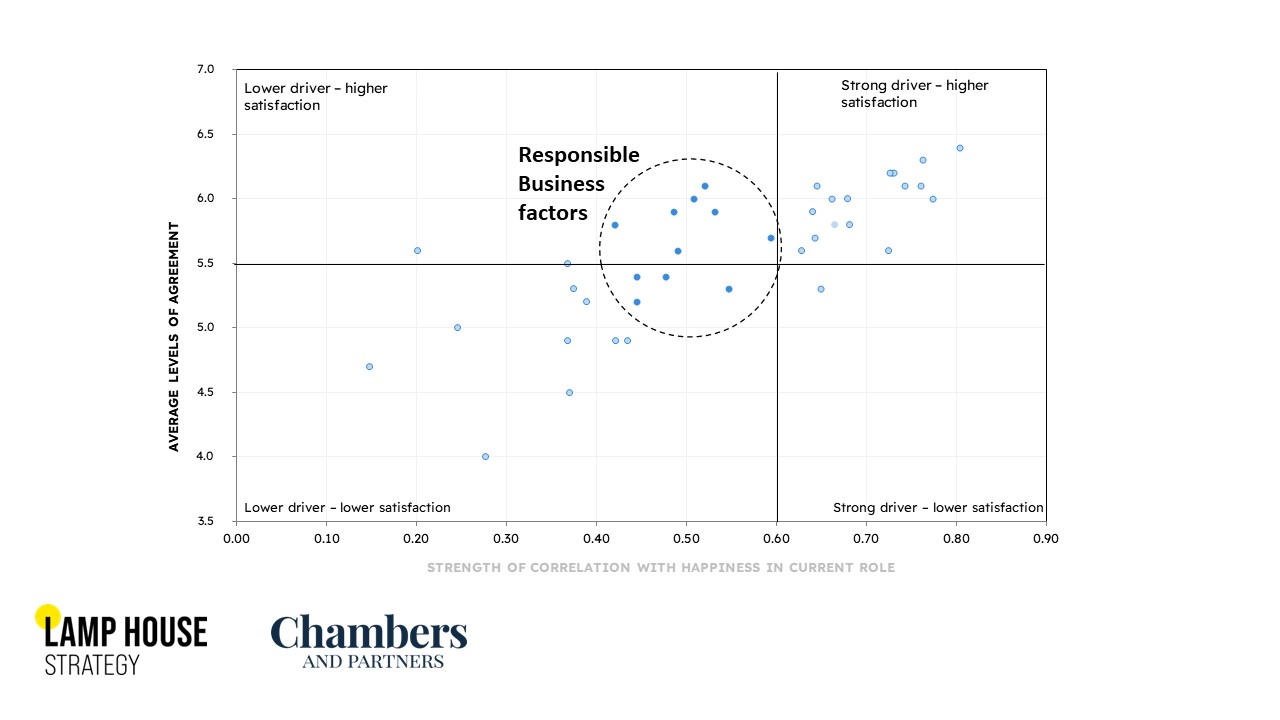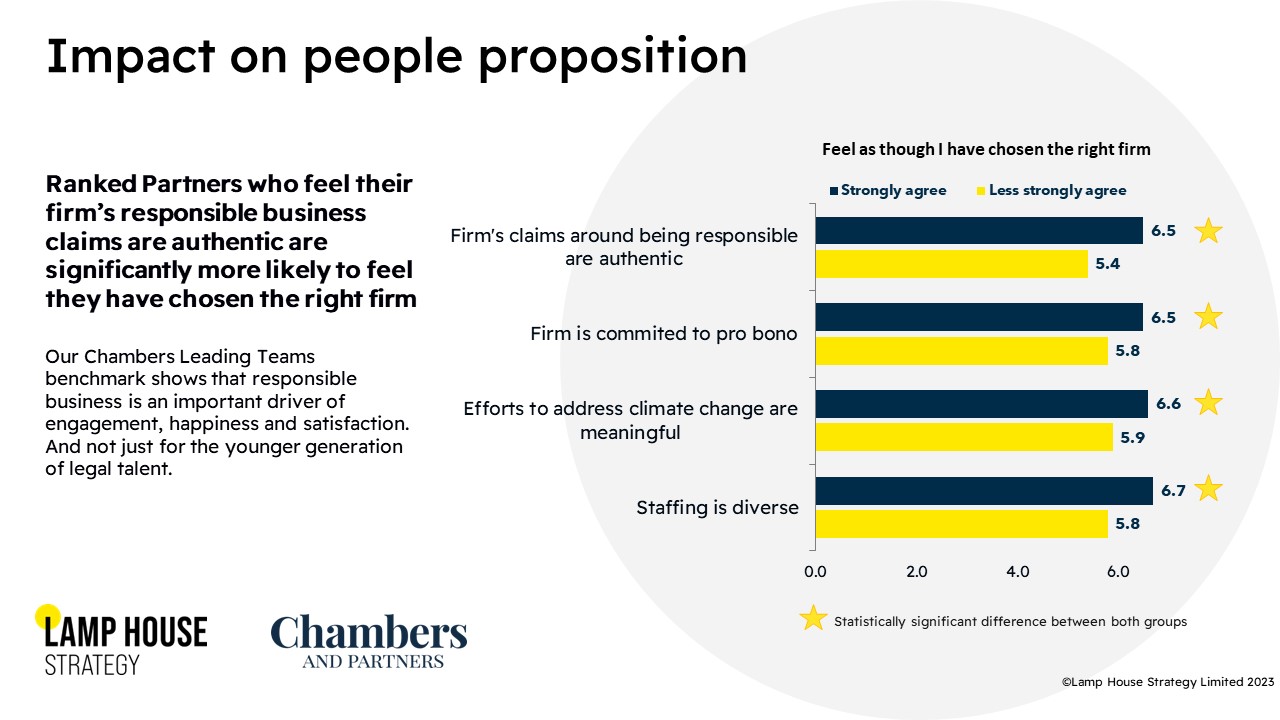Responsible Business: the new battleground for employer brand?

The drivers of engagement for top legal talent are changing.
Our new Leading Teams research, which to date has surveyed over 400 Ranked Partners, shows that there is an emerging set of factors which are driving engagement.
Taken together, these drivers are all about responsible business.
These responsible business factors strongly correlate with a Partner’s level of happiness in their role. But, Partners generally have a more polarised view of how their firms are performing in these areas.
What that means for law firms is much greater potential to differentiate their employer brand around responsible business in the ongoing war for talent.
In this article, we’ve collated some of the latest findings from our legal talent benchmark research and our thoughts on how firms can better leverage responsible business in building their employee proposition.
How does responsible business impact happiness in a Partner’s role?
Not all aspects of law firm life are equal when it comes to driving engagement.
In partnership with Chambers, our Leading Teams benchmark measures the impact of almost 50 different aspects of life at a firm to understand which are key to creating engagement, motivation and advocacy.
A striking pattern is already emerging, with three distinct clusters of factors correlate to happiness in a role (spoiler – remuneration is low on the list!)

We group these three clusters as follows:
- The non-negotiables
These factors have the strongest correlation with happiness, making it crucial for firms to get these right in order to engage talent.
All of these factors relate to the micro-culture of the specific teams Partners operate within: that work is interesting, there is camaraderie among the team, people can be themselves, and there is opportunity for Partners to develop their practice.
Most firms seem to be performing well on these ‘non-negotiables’, at least at Partner level, with high satisfaction with these crucial drivers of engagement.
- Leadership levers
The second group of drivers relate to leadership.
For example, Partners believing in the firm’s long-term vision, strategy being well communicated and transparency around decision making processes.
Again, these factors are very important to engagement, though there is slightly more variation in how satisfied Partners are with their firm’s performance in these areas.
- Responsible business
The third group of drivers are factors which we may not have imagined to be such strong drivers of engagement only a few years ago.
All of these factors are about responsible business.
What we mean by ‘responsible business’ is factors that relate to the impact the law firm has on its own people’s lives and wellbeing, as well as its broader social and environmental impact as a business. This covers factors such as:
- Flexible working policies
- Mental health policies
- Diverse staffing
- Commitment to pro bono
- Sufficient staff for volume of work
- Authenticity of the firm’s responsible business claims

What we have been fascinated to see is that these measures are important drivers of satisfaction for top, Partner-level talent.
Evidently, it’s not just the next generation of talent that care about their firm’s responsible business, or ESG, credentials. As we continue to roll out our research with associate-level talent, we expect we will see an even stronger link between these responsible business factors and happiness.
Unlike the non-negotiables and leadership levers, there are more varied levels of satisfaction among Partners on responsible business measures.
This opens up much more opportunity for firms to differentiate their employee proposition around these important drivers of engagement. But, the question for firms is how they can do this in a way that is credible, meaningful and authentic.
What do law firms need to do to enhance their responsible business brand?
- Showcase responsible business activity
Firms are underplaying the breadth and depth of their responsible business activity in their own external communications.
Lamp House Strategy’s analysis of law firm responsible business strategies shows that some firms are failing to communicate more than 50% of their internal responsible business initiatives in their online communications.
For a lot of firms, there is a relatively quick-win to be had in publishing more cohesive and accessible information on their responsible business initiatives – for example, through producing an integrated responsible business report.
An example of great reporting that we love comes from Burges Salmon. The firm is one of the leaders in this space, and its reporting provides a thorough overview of its ambitions, approach and progress in sustainability, inclusivity and wellbeing.
Some firms also produce more detailed reports on the firm’s strategies and achievements in discrete areas – a great example here being Slaughter & May’s Race Fairness Action Plan.
By pulling together this information into a central place, firms can clearly communicate and showcase their approach to responsible business to current and prospective talent.
- Walk the talk
The firms that top our responsible business benchmark are not the ones that fill their reporting with empty platitudes.
Being able to evidence substantial, tangible actions that prove the commitment to responsible business practices is how firms create an authentic approach that its people can buy into.
What we already see in Leading Teams is that Ranked Partners who feel their firm’s responsible business claims are authentic are significantly more likely to feel they have chosen the right firm.

The same is true among Partners who believe their firms are committed to pro bono and that they are addressing climate change in a meaningful way.
Communicating that your firm’s approach is authentic is, of course, not the same thing as being truly authentic.
So, how can firms prove this? Data is the answer.
Firms need a way to measure the impact of its responsible business strategy. It might mean collecting data points on:
- uptake of particular initiatives or policies across the firm
- employee satisfaction with particular initiatives
- employee agreement with the firm’s overall responsible business claims
We know that many firms are sometimes scared to ask these questions. But, the firms that take the leap are those that will get ahead in establishing themselves as a responsible business leader, which is a huge draw for talent.
- Telling your responsible business story
Now comes the difficult bit.
Firms need to go through steps one and two to build an authentic narrative around responsible business: what are the tangible things the firm is doing to have a positive impact on people and planet? What are the firm’s ambitions in this area and what is its current impact?
Once a firm has landed on what that is, it needs to start telling that story. This is not just about having a great external comms strategy, but also making sure that this story is understood internally.
One thing we see within firms is that their own people are not even aware of the investments their firm is making in responsible business – especially if these are happening in different areas or regions of the firm.
More broadly, there is a huge amount of upskilling needed within firms when it comes to responsible business, especially among fee-earners.
Our research with GCs in the UK showed that only 22% strongly agree that their law firms are genuinely committed to ESG. GCs also strongly believe that lawyers being trained to apply a responsible business lens to their advice is an incredibly important aspect of responsible business practice.
With client demand for responsible business advice and authenticity growing alongside that of talent, firms need to empower their people so that they feel confident in talking about the firm’s actions and credentials in this space.
Whether through incentives, training, data, workshops – there is a lot which firms can do to generate buy-in across the firm for its responsible business agenda and making sure that talent see the impact of the firm’s investment in this space.
Responsible business as a differentiator of employer brand
Our Leading Teams data shows how important responsible business is as a driver of engagement for existing top-talent. We are looking forward to growing our benchmark over time to include more junior legal talent and business services teams to see the impact across these other roles, as well as how the picture may change across regions and practices.
What is already clear though is that no firm is owning this space. Responsible business is one area where there is more room for firms to differentiate their employer brand.
Stronger comms, data and storytelling are some of the ways in which firms can start to build their employee proposition around responsible business. Authenticity is key though, but firms that put in the work can expect to reap the reward.
If you want to see how your talent compares to peer firms and the wider legal industry, get in touch! We’d be happy to answer any questions about our Leading Teams research and share how you can get involved.

